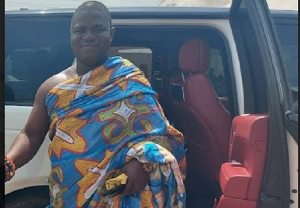Regional News of Thursday, 21 March 2024
Source: Amanda Atunah, Contributor
Ashaiman chief urges media restraint amidst sensationalism
The Chief of Ashaiman, Nii Annang Adzor, has issued a clarion call for circumspection in reporting sensitive matters within the Ghanaian media landscape.
This plea follows concerns from traditional authorities regarding the sensationalism surrounding certain news items.
Nii Adzor emphasised the need for a discerning approach, particularly in light of pressing national issues that demand immediate attention and resolution.
Expressing his dismay at the current trend, the chief lamented the proliferation of sensitive topics, such as poisoning allegations, in the public sphere, exacerbated by the pervasive influence of Western civilization through social and electronic media channels.
According to him, such acts shouldn’t be tolerated in the media, as their consequences are dire.
“Years ago, such matters were not aired in public. But today, the infiltration of Western values via social media has inundated us with sensationalism. The gatekeepers must question the veracity of these claims and demand thorough investigations before disseminating them to impressionable audiences,” he mentioned.
Impact:
Drawing parallels to a bygone era of discretion, Nii Adzor underscored the adverse impact of such sensationalism on the nation’s youth.
He expressed grave concerns about the potential repercussions on mental health and societal values, urging politicians to prioritise Ghana’s collective well-being over personal or political vendettas.
“It is appalling that those elected to represent us in Parliament would resort to violence against one another. I implore politicians to reflect on their actions and consider the legacy they leave for future generations. Ghana is our only home, and we cannot allow sensationalism to erode our societal fabric,” he noted.
Nii Adzor further highlighted the stark contrast between Ghana’s plight and the forward-thinking initiatives undertaken by countries like China and other Asian nations. While they focus on national development, he lamented Ghana’s preoccupation with self-destructive media narratives.
“This sad phenomenon must cease. We must redirect our energies towards nation-building and emulate the dedication shown by our counterparts in Asia. Our youth deserve better, and it is incumbent on us to safeguard their future,” he indicated.
Nii Adzor’s impassioned plea serves as a poignant reminder of the media’s profound influence and its responsibility to uphold ethical standards.
It is imperative that, as Ghana navigates the complexities of a modern media landscape, his words resonate as a call to action for all stakeholders to prioritise unity, integrity, and progress above all else.











